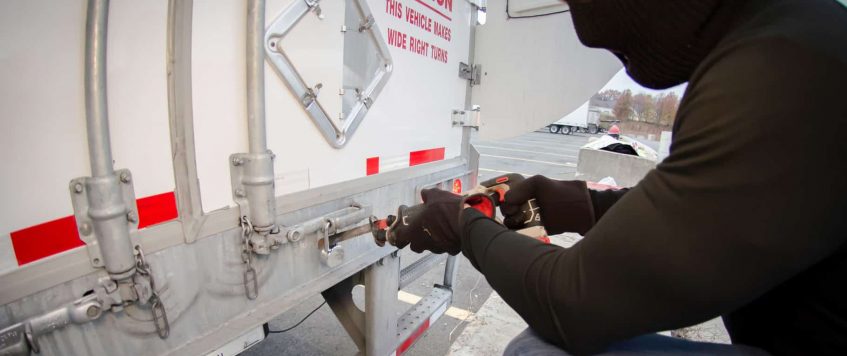-
12
Feb
Cargo Thefts Spike 15% across US, Canada in 2022
The end of 2022 saw a surge in cargo thefts that pushed the yearly total to above an estimated $223 million worth of goods stolen across Canada and the U.S., according to recent data from CargoNet.
The Verisk Analytics-owned data firm, which tracks voluntarily reported cargo thefts, recorded 1,778 “supply chain risk incidents” in Canada and the U.S. in 2022, a 15% jump compared to 2021.
“The No. 1 commodity [for cargo theft] was household goods for all of 2022, electronics was No. 2, and then food and beverage commodities were No. 3,” Scott Cornell, transportation lead and crime and theft specialist at Travelers, told FreightWaves.
California led the way with 417 reported cargo thefts in 2022, a 41% year-over-year increase, followed by Texas with 223 and Florida with 153.
CargoNet’s 2022 data showed the average value of cargo stolen in a theft was $214,104, a 20% increase compared to 2021.
Cargo theft hot spots are typically areas around major ports, as well as intermodal facilities, distribution centers and truck stops.
“When we look at the hot spots in general for cargo theft, they tend to be port areas,” Cornell said. “If you look at the heat map that CargoNet puts out, you’ll see California is always No. 1. California definitely has several ports in that state, then Florida, another port state, Texas, Georgia, New Jersey, Illinois, that’s really considered an inland port because of the rail yards, same thing for Memphis, almost sort of an inland port because of the rail yards.”
Danny Ramon, an intelligence and response manager at Overhaul, a real-time visibility and risk management platform based in Austin, Texas, said wherever there is a density of cargo and large populations there are going to be thieves “targeting low-hanging fruit.”
“Whenever you’ve got a lot of cargo, somebody’s going to be the low-hanging fruit. Somebody didn’t actually get to park inside the parking lot that’s gated, somebody had to park outside of the coverage of the streetlights or the CCTV cameras, somebody at the truck stop was going to leave their load alone for more than more than 10 or 20 minutes, giving thieves the opportunity to steal the entire tractor-trailer,” Ramon said.
Organized crime rings can react quickly to market trends
Cornell said nine out of 10 times a cargo theft incident occurs, it’s usually perpetrated by an organized crime group.
“Most of the time, cargo theft is committed by organized rings and those rings are usually fulfilling orders,” Cornell said. “They have orders that they’re filling, trying to meet the needs of their customers that they have within their own supply chain that have asked them for electronics or energy drinks, cleaning supplies, things like that.”
According to CargoNet, cargo theft in Georgia increased 34% year over year, partly due to organized crime groups that took advantage of increased traffic at the Port of Savannah.
Cornell said one of the most common methods of cargo theft is surveilling a truck or shipments outside of busy distribution centers.
“[Cargo thieves] know the distribution centers for what they distribute,” Cornell said. “So if they know that this distribution center distributes energy drinks — they know that from gathering intel — they know if they follow a truck out of that warehouse, there’s a pretty good chance they’re going to get energy drinks.”
Ramon said organized cargo theft rings and the black market can often react more quickly to market demand than normal supply chains.
“These criminals can react, turn on a dime, react to market trends very quickly,” Ramon said. “Anything that has retail purchasing restrictions is going to be big. Anything that’s bearing a bigger brunt of inflation or product shortages, for whatever reason, whether that’s because of flooding in California or avian flu, anything causing things to go up and desirability to go up in price because there’s a shortage is definitely going to be targeted.”
Strategic thefts, fictitious pickups, double brokering on the rise
Both Cornell and Ramon said they have seen an increase in more sophisticated methods of cargo theft, such as strategic thefts, which include identity theft, fictitious pickups and double brokering scams.
“Strategic theft by definition is when cargo thieves basically trick you into giving them the cargo,” Cornell said. “Within strategic theft, the most common one tends to be identity theft, and that’s where they basically steal the identity of a legitimate trucking company, they pose as that company on load boards or the internet or by calling a freight broker.”
Thieves posing as a legitimate trucking company, called ABC Trucking, will negotiate a price for a load with brokers, pick up the load and then disappear, Cornell said.
“If you’re a freight broker, you call ABC Trucking a couple days after the loads are picked up. You say, ‘Hey, you guys picked up these loads the other day and they were never delivered,’” Cornell said. “Then ABC Trucking says, ‘Yeah, we never picked those up. We don’t know who you dealt with but it wasn’t us.’”
Ramon said identity theft and fictitious pickups used to be more common at West Coast ports but moved to East Coast facilities in 2022.
“Overhaul just put out a bulletin to our customers and clients talking about how primarily this has been a Southern California modus operandi, this fraudulent effort or strategic cargo theft,” Ramon said. “We’re starting to see some of the same actors actually branch out to the East Coast, as well as Indiana and Illinois.”
By: Noi Mahoney / FreightWaves

